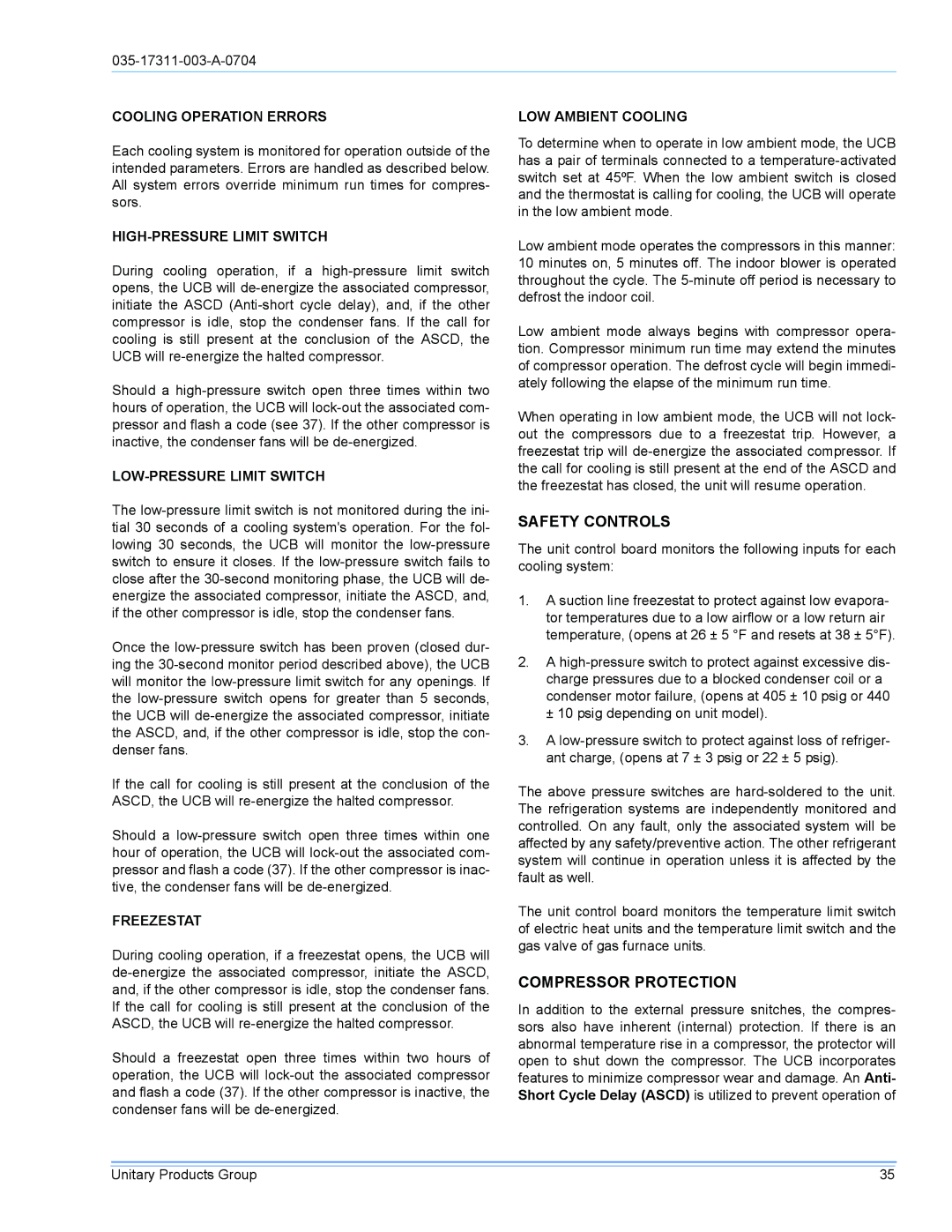COOLING OPERATION ERRORS
Each cooling system is monitored for operation outside of the intended parameters. Errors are handled as described below. All system errors override minimum run times for compres- sors.
HIGH-PRESSURE LIMIT SWITCH
During cooling operation, if a high-pressure limit switch opens, the UCB will de-energize the associated compressor, initiate the ASCD (Anti-short cycle delay), and, if the other compressor is idle, stop the condenser fans. If the call for cooling is still present at the conclusion of the ASCD, the UCB will re-energize the halted compressor.
Should a high-pressure switch open three times within two hours of operation, the UCB will lock-out the associated com- pressor and flash a code (see 37). If the other compressor is inactive, the condenser fans will be de-energized.
LOW-PRESSURE LIMIT SWITCH
The low-pressure limit switch is not monitored during the ini- tial 30 seconds of a cooling system's operation. For the fol- lowing 30 seconds, the UCB will monitor the low-pressure switch to ensure it closes. If the low-pressure switch fails to close after the 30-second monitoring phase, the UCB will de- energize the associated compressor, initiate the ASCD, and, if the other compressor is idle, stop the condenser fans.
Once the low-pressure switch has been proven (closed dur- ing the 30-second monitor period described above), the UCB will monitor the low-pressure limit switch for any openings. If the low-pressure switch opens for greater than 5 seconds, the UCB will de-energize the associated compressor, initiate the ASCD, and, if the other compressor is idle, stop the con- denser fans.
If the call for cooling is still present at the conclusion of the ASCD, the UCB will re-energize the halted compressor.
Should a low-pressure switch open three times within one hour of operation, the UCB will lock-out the associated com- pressor and flash a code (37). If the other compressor is inac- tive, the condenser fans will be de-energized.
FREEZESTAT
During cooling operation, if a freezestat opens, the UCB will de-energize the associated compressor, initiate the ASCD, and, if the other compressor is idle, stop the condenser fans. If the call for cooling is still present at the conclusion of the ASCD, the UCB will re-energize the halted compressor.
Should a freezestat open three times within two hours of operation, the UCB will lock-out the associated compressor and flash a code (37). If the other compressor is inactive, the condenser fans will be de-energized.
LOW AMBIENT COOLING
To determine when to operate in low ambient mode, the UCB has a pair of terminals connected to a temperature-activated switch set at 45ºF. When the low ambient switch is closed and the thermostat is calling for cooling, the UCB will operate in the low ambient mode.
Low ambient mode operates the compressors in this manner: 10 minutes on, 5 minutes off. The indoor blower is operated throughout the cycle. The 5-minute off period is necessary to defrost the indoor coil.
Low ambient mode always begins with compressor opera- tion. Compressor minimum run time may extend the minutes of compressor operation. The defrost cycle will begin immedi- ately following the elapse of the minimum run time.
When operating in low ambient mode, the UCB will not lock- out the compressors due to a freezestat trip. However, a freezestat trip will de-energize the associated compressor. If the call for cooling is still present at the end of the ASCD and the freezestat has closed, the unit will resume operation.
SAFETY CONTROLS
The unit control board monitors the following inputs for each cooling system:
1.A suction line freezestat to protect against low evapora- tor temperatures due to a low airflow or a low return air temperature, (opens at 26 ± 5 °F and resets at 38 ± 5°F).
2.A high-pressure switch to protect against excessive dis- charge pressures due to a blocked condenser coil or a condenser motor failure, (opens at 405 ± 10 psig or 440
± 10 psig depending on unit model).
3.A low-pressure switch to protect against loss of refriger- ant charge, (opens at 7 ± 3 psig or 22 ± 5 psig).
The above pressure switches are hard-soldered to the unit. The refrigeration systems are independently monitored and controlled. On any fault, only the associated system will be affected by any safety/preventive action. The other refrigerant system will continue in operation unless it is affected by the fault as well.
The unit control board monitors the temperature limit switch of electric heat units and the temperature limit switch and the gas valve of gas furnace units.
COMPRESSOR PROTECTION
In addition to the external pressure snitches, the compres- sors also have inherent (internal) protection. If there is an abnormal temperature rise in a compressor, the protector will open to shut down the compressor. The UCB incorporates features to minimize compressor wear and damage. An Anti- Short Cycle Delay (ASCD) is utilized to prevent operation of

